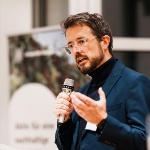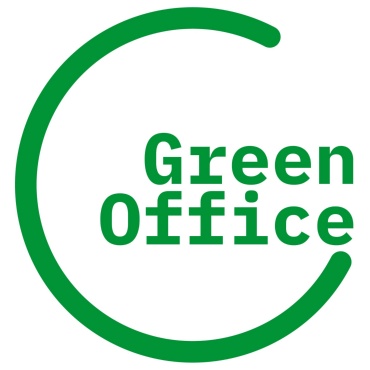
Emphatic commitment to sustainable development
The University of Stuttgart aims to become climate-neutral by 2030, thus supporting the aspirations of the state of Baden-Württemberg in ensuring that the operation of state government is climate neutral by 2030, and the entire state by 2040. The University of Stuttgart thus also contributes to the city of Stuttgart's goal of achieving net zero emissions by 2035.
Achieving ecologically and socially sustainable development across all areas of the University of Stuttgart – research, teaching, knowledge and technology transfer, management, and operations – is one of our core strategic objectives. This must serve as the standard by which all actions are measured.
Prof. Manfred Bischoff, Vice Rector for Research and Sustainable Development
First sustainability report focuses on energy and climate protection
The sustainability report focuses on “Energy and Climate Protection”, but also highlights important topics such as sustainable procurement and social sustainability. A sustainability chronicle shows important steps that the university has taken since 2008.
United in shaping sustainability
Making an impact together: The first strategy dialog and fireside chat, marked the launch of a strategy that aims to strengthen sustainable developments at our university in terms of visibility, networking and impact. The Green Office strengthens networks between all those involved in sustainability and invites all university members to implement ideas for more sustainability, together with sustainability, mobility, and energy management. Students and employees are given the opportunity to actively help shape and drive projects together.
[Photos: o.A., o.A., Christina König, University of Stuttgart, Institute for Photovoltaics]
A selection of other activities and institutions
At the institute level, faculty-wide, and in interdisciplinary networks, research is being conducted on topics of sustainability that enrich the sustainable development of the University of Stuttgart: topics such as sustainable construction, sustainable mobility, environmental protection, efficient energy systems, and climate impact research.
A selection of large ongoing research projekts and joint research:
- ARENA 2036
- ERC Synergy Grant Urbisphere
- Cluster of Excellence Integrative Computational Design and Construction for Architecture (IntCDC)
- Center for Transportation Research (FOVUS)
- Collaborative Research Centre 1244 Adaptive skins and structures for the built environment of tomorrow
- Stuttgart Research Center for Architecture (ArchIDA)
- Stuttgart Research Focus Interchange Forum for Reflecting on Intelligent Systems (IRIS)
- Stuttgart Research Initiative CHEMAmpere
- Stuttgart Research Initiative on Integrated Systems Analysis for Energy (STRise) [de]
- Stuttgart Research Initiative Valorisation of Bioresources
- Wind Energy Research Cluster WindForS
The university offers a wide range of sustainability-related study programs. This includes a total of 15 Bachelor’s and Master’s degree programs from the fields of architecture, energy technology and energy supply, transport and mobility, and environmental engineering.
- The Campus Bees Working Group is a service offered by stuvus (Student Council of the University of Stuttgart) to learn beekeeping and manage bee colonies on the campus in Stuttgart-Vaihingen.
- The Green Canteen Working Group is concerned with sustainability in the Studierendenwerk and with raising student awareness of sustainable nutrition.
- The Campus for Future is committed to more climate protection at the University of Stuttgart and on campus.
- Crossing Borders Stuttgart e.V. is an association involved in various educational projects with schoolchildren to disseminate knowledge about renewable energies. It originated from the “Renewable Energies” study program at the University of Stuttgart.
- frei[raum] Co-Working and Makerspace is a co-working and makerspace on the Vaihingen Campus that provides rooms and support for start-up projects of the University of Stuttgart.
- The Green University Group promotes green issues within the framework of higher education policies.
- Infinity Stuttgart supports its members in finding solutions to the most pressing ecological issues at the local level, for example by means of presentations, workshops, panel discussions, project days, and projects.
- MitMachGarten is a student-run garden on the Vaihingen Campus.
- Sustainability in the Student Council - The Student Council (stuvus) wants to become more sustainable in its own actions. For this purpose, a sustainability guideline was created, as well as a web page that presents the topic of sustainability from the perspective of stuvus.
- Sustainability Weeks @ Higher Education Institutions in Baden-Wuerttemberg is an event series that is organized by students of various disciplines and from different higher education institutions and offers a varied, interdisciplinary program.
- reason[Ing.] is a university group that organizes events related to issues at the intersection of ethics and technology.
- The stuvus Sustainability Office has the goal and mission to raise awareness of sustainability at the university and within the student body.
The Campus Vaihingen is an agile testing ground for initiatives and innovations that are tested under real conditions and carried into the world. In addition, it features institutions and infrastructure that contribute to sustainable development.
Sustainability and energy efficiency in construction are important concerns for the University of Stuttgart. Construction and renovation measures at the University of Stuttgart are carried out collaboratively with the state in accordance with the sustainability standards of NBBW.
The university’s sustainability governance is characterized by a culture of participation, advisory committees, and systematic management:
- Prof. Dr. Manfred Bischoff, Vice Rector for Research and Sustainable Development
- Green Office
- Mobility and Sustainability Management
- Energy Manager
- Occupational safety and environmental protection
- Equal opportunities and diversity
- Energy and Climate Protection Working Group: Under the leadership of the Rector, this working group is developing an energy and climate protection concept for the university.
- Sustainability Roundtable: The Sustainability Roundtable advises the Rectorate on sustainability-related issues.
Contact persons: Prof. Dr. Manfred Bischoff, Vice Rector for Research and Sustainable Development and Dr. Charlotte Toulouse, Scientific Assistant to the Rector
Kontakt

Felix Hebeler
Dr.Head of Green Office und Sustainability Manager

Brigitte Lorenz
Dr.Sustainability manager

Harald Hentze
Energy Manager














